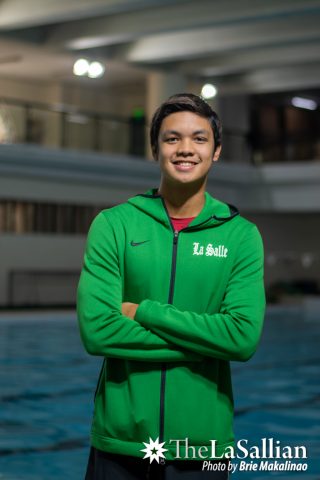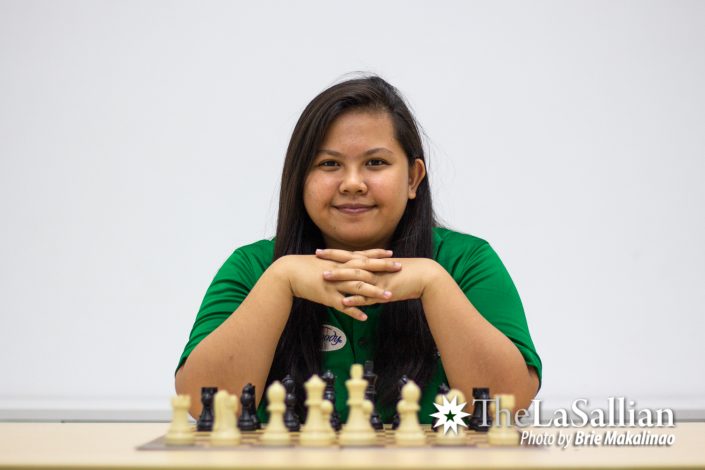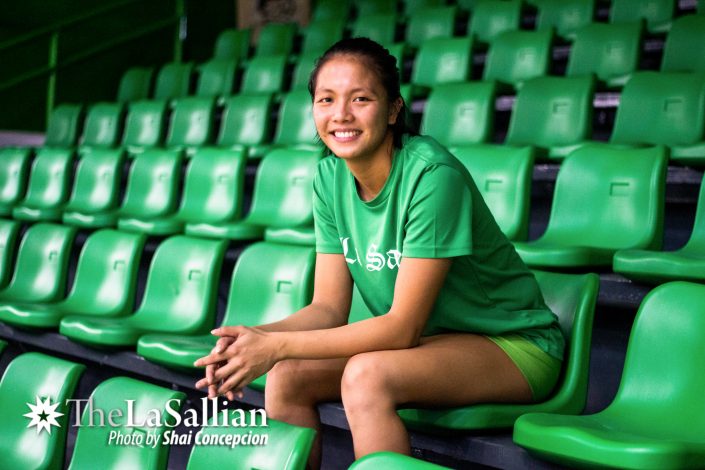As the first half of UAAP Season 82 came to an end, some of La Salle’s squads have poured out their hearts to represent the school with honor and pride. In every unit, a chosen athlete accepts the challenge of motivating their teammates while steering them toward victory. The role of a team captain varies across each dynamic sport; yet, one responsibility must consistently stand out—to lead.
But effective leadership can mean different things for different teams, governed not only by the captain’s own persona and leadership style, but also by the teammates’ needs and personalities, as well as the nature of the sport itself.
Walking the talk
“Pain is temporary, glory is forever” is what Green Tanker team captain Alnair Guevarra lives by, enabling him to press forward while also inspiring his teammates to do the same. For him, it is about setting a good example and being the “first to obey the rules.” He is usually the first one into the pool to begin the training session, hoping that by embodying the values of hardwork and perseverance, his teammates would also follow suit.

“’Yung mga workout namin sobrang hirap, tapos ang dali naming mapagod. Since sabay-sabay [kaming] nagtr-training, dapat lagi [kaming] nagpu-push para matapos ‘yung mga workout,” Guevarra explains that when his fellow swimmers feel fatigued during training, his role as captain is to urge them to keep going. “[Kung] napapagod na sila, sasabihin ko, ‘Kaya mo ‘yan.’”
(The intensity of our workout causes us to tire out easily. Since we train together, we must push through to accomplish our training session. If they feel exhausted, I encourage them by saying, “You can do it.”)
In addition, the captain effectively becomes the coaches’ second voice, accepting extra responsibilities to help prepare the team for upcoming swim meets. “Ako ‘yung nag–a-assign kung saan sila dapat lumangoy na event para ma-distribute accordingly ‘yung mga strokes na ginagawa nila—’yung best strokes nila,” he discusses.
(I assign the events that each member of the team should swim so that the strokes are distributed according to what each person is best at.)
After exhausting his playing years, Guevarra says that he still hopes to help the team out in any way that he can—imparting his veteran experience to the younger players, from academics to pacing during events, or simply joining them as they swim laps.
Leading the pack
Leading a squad can take its toll, but Lady Tanker Ace Agustin has shown no sign of fatigue in leading the women’s swimming team, becoming their captain for two consecutive years. She notes that her position does bring a bit of additional pressure, expressing, “Not only are your teammates relying on you, your coaches are relying on you, and the [Office of Sports Development] is relying on you. Many people are expecting so much of you to do a certain task or act a certain way.”
But Agustin has since grown into the role, developing her own leadership style. “As a captain I was never strict with them, I wasn’t the type [to dictate] everything. I let them go on their own path…As long as they keep themselves in check,” she discusses how she differs from past captains. This approach has cultivated a stronger bond among the Lady Tankers; Agustin wanted everyone on her team to be like “sisters”, creating that same sense of “family” she experienced as a rookie.

“In [the] UAAP, it’s not just [a] physical competition but [it’s] also mental. You need each other talaga for the mental strength because if you have sisters [that] you know are there for you or are proud of you, then you’ll feel [that] you’re proud—you’re doing enough,” she affirms.
Just like an elder sister, Agustin tries to ensure that her teammates compete with the right mentality, as she shares how she boosts their spirits, “I [keep] repeating the phrase to them, “Kakayin diba? Kakayanin!” and I’d make them say it to me, ‘Yes, kakayanin! With confidence’ and I’d say, ‘Kakayanin! With confidence.’”
Trusting teammates
Being the senior on the team, Lady Spiker Ernestine Tiamzon has experienced enough to know what it takes to lead DLSU’s beach volleyball squad; the veteran athlete has also witnessed the differences in team dynamics between beach volleyball and indoor volleyball. As she discusses, “I think it’s more challenging when you are a captain for indoor because there’s more people that you have to think about, whereas in beach volleyball, there’s only three of us.”
As their captain, Tiamzon believes that playing a good game propels her teammates to perform well. “I try to motivate them through my actions. As much as possible, I want to do the right thing on the court so that they’ll be motivated to follow what I’m doing,” she explains.
Further, the captain considers herself “lucky” to have gotten junior teammates who “are really mature for [a frosh] and sophomore” as she “didn’t really have to think about them.” In fact, Tiamzon acknowledges her teammates for encouraging her to carry on as she dealt with some personal struggles in the midst of the UAAP beach volleyball tournament.
“We were close in making it to gold, but there were certain setbacks that made me unable to focus as much as I wanted to. My teammates supported me when I needed it the most and I’m so thankful for that,” she reveals. “They’ve got my back, and I’ve got their back for the whole tournament.”
Ultimately, Tiamzon’s best reminder for her team is to give it their all, regardless of what the result may be, as she believes this is key to not having any regrets afterwards.
Embracing challenges
To be able to lead a team that has lost vital members, a team captain needs to keep herself together to keep her team together. Such was the case for team captain Ella Grace Moulic as she had to guide the DLSU Lady Woodpushers in the face of mounting pressure this year—navigating the departure of key players prior to the season as well as the prospect of a title defense.
“We embraced the challenge, then we did something about it,” Moulic shares, heeding head coach Susan Neri’s advice to “let go of the past [and] create [one’s] own story.” Despite settling for second in the UAAP chess tournament, the squad grew through learning to trust one another. The captain elaborates, “Hinuhugutan namin ng lakas ‘yung sarili namin…Kapag ready kami, nakikita ng mga mas [nakakabata] sa amin na we’re confident, I think mabo-boost yung motivation nila.”
(We draw strength from within ourselves and from each other. If the younger ones see that we’re ready and confident, then I think that their motivation would be boosted.)
Although chess is an individual sport, Moulic highlights how it remains a team effort for the Green-and-White, emphasizing the significance of camaraderie and team chemistry. “We [do] not [only] fight for ourselves…Hindi ako naglaro para manalo para sa sarili ko; pinaglalaban ko kung ano ‘yung gusto namin as a team,” affirms the captain.
(I don’t play for myself; rather, I fight for what we want as a team.)
At the end of the day, the captain expresses pride in witnessing the Woodpushers’ drive to persevere even though the odds were stacked against them, describing, “‘Yung attitude na ‘di ka susuko…‘yung passion, resilience, and trust.”
(They never gave up.)
Although the aforementioned captains failed to take home titles in this edition of the UAAP, these experiences will only propel La Salle sports to greater heights, inspiring younger athletes to eventually take on the daunting task of leading a team.
Further, part and parcel of being a leader involves being one with the team—in victory and in defeat—as well as prompting teammates to rise again, learn, and improve. As Moulic puts it, “Sometimes you lose; sometimes you win…If laging panalo, ‘di ka masyado magre-reflect. Unlike kung natalo ka, nakita mo ‘yung mistake, then you can do something about it.”
(Sometimes you lose; sometimes you win. You would not reflect as much if you were always winning. Meanwhile, losing lets you recognize your mistakes, so you can do something about it.)


